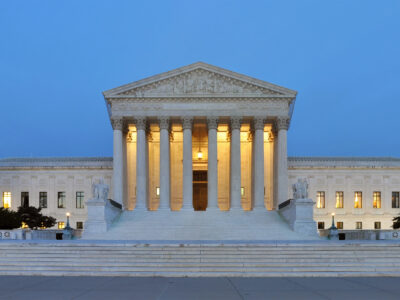Appointing Guardians to Represent Future Generations
Could an old property procedure be a model for climate-related litigation?
From time to time, there is talk about giving standing to future generations. Although this is an idea whose time may not have come in the U.S., it’s important to know that the law has for many, many years allowed appointment of lawyers to represent future individuals.
Typically, this is a procedure that is used in estate or trust cases. In California, this procedure is a matter of statute. Section 373.5 of the Civil Procedure Code provides:
“If . . . a person or persons of a designated class who are not ascertained or who are not in being, or a person or persons who are unknown, may be or may become legally or equitably interested in any property, real or personal, the court in which any action. . . affecting the property is pending, may . . . appoint a suitable person to appear and act therein as guardian ad litem of the person or persons not ascertained, not in being, or who are unknown.”
This provision is used only when there is a conflict of interest between existing beneficiaries and future ones.
This provision could conceivably be used outside the domain of trust or estate law, given the breadth of the statutory language. There seems to be a conflict of interest in the case of climate policy, where the stake of future generations is much larger than the current generation. Arguably, given the interest of future generations in coastal lands that may be destroyed by future climate change or in water rights that could be rendered worthless by climate change, the statute could be used to ensure their representation in relevant litigation. Or perhaps the public trust could be considered sufficiently analogous to a conventional trust to support use of this technique.
That may be a bit too much of a stretch of section 373.5 , although perhaps it shouldn’t be ruled out. More importantly, however, it shows that there’s a very legitimate pedigree for the concept of legal representation for future generations. Who knows? Maybe the idea of standing for future generations isn’t quite so zany after all.
Reader Comments
5 Replies to “Appointing Guardians to Represent Future Generations”
Comments are closed.







How about challenging the investment policies of CALPERS in fossil fuel companies, including coal-based utilities (and other extractive industries) on behalf of unknown future beneficiaries who will be harmed by those investments? The future beneficiaries clearly have an interest in the property and equally clearly will be damaged by drastic climate change. And the value of fossil fuel investments and sunk costs in fossil fuel electric generating facilities will clearly sink as society begins to really suffer from the effects of climate change.
I suppose there would be hurdles involved in the general question of beneficiary participation in investment decision-making. But the case would at least dramatize the reality that today’s investment decisions affect future beneficiaries in ways that should influence investment policy.
Samuel Said,
“…..How about challenging the investment policies of CALPERS in fossil fuel companies, including coal-based utilities (and other extractive industries) on behalf of unknown future beneficiaries who will be harmed by those investments…..”
Dear Samuel and Dan,
Before anyone claims climate damage, first there must be credible evidence of the damage and its cause. We know for a fact that climate change is a natural process and there is no conclusive scientific evidence that weather related damages are the result of anything other than natural calamities and cycles of nature. Why should anyone reasonably assume that contrived climate damage scenarios are somehow caused by atmospheric carbon dioxide and not natural calamities and cycles of nature?
The Trump Administration is critical of frivolous environmental litigation and will likely mandate new policies at EPA and DOJ to discourage such practices. Likewise, the Clean Power Plan would likely be set aside and abandoned.
Dan, protection of quality of life for future generations is the greatest failure of UC today.
Specifically, UC professors and scholars have refused to join together to overcome the human failure mode documented in the 2006 “Global Warning” issue of CALIFORNIA alumni magazine:
“Can we adapt in time?”
http://alumni.berkeley.edu/california-magazine/september-october-2006-global-warning/can-we-adapt-time
Anthony,
Why must you keep picking on Dan and UC for failing to fix the climate? It’s not their fault, there is nothing they can do about it. Yes we know that certain members of the California Environmental Bar sometimes act like they know how to fix the climate, but that’s just an act for the purpose of making a living. That’s how the real world works. Grow up, be a man, discern, reason, don’t fret over nonsense.
BQRQ, I must admit that “act like they know how to fix the climate, but that’s just an act for the purpose of making a living” is as good an explanation as any because they don’t even fix campus problems like out of control sexism, racism and poverty.
The most inconvenient truth of all is that the 2006 “Global Warning” issue of CALIFORNIA is now 10 years old and appears to have been marginalized by the ivory tower elite.
In the meantime, all of our political and intellectual institutions continue to fail to improve and perpetuate an acceptable quality of life for “Future Generations” because the power of money rules, a fact that Ike gravely warned us about in his 1961 Farewell Address that has also been marginalized by the powers that be.